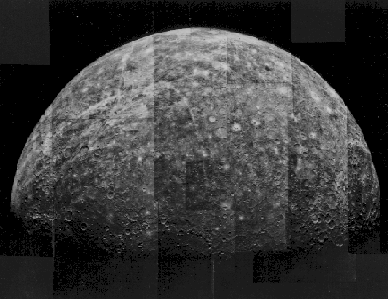
Mercury: Closest Planet to the Sun
Credit: NASA, Mariner 10
Discover the cosmos! Each day we feature a different image or photograph of our fascinating universe, along with a brief explanation written by a professional astronomer.
August 14, 1995

Mercury: Closest Planet to the Sun
Credit:
NASA,
Mariner 10
Explanation: This picture was compiled from images taken by the NASA spacecraft Mariner 10 which flew by the planet three times in 1974. Mercury is the closest planet to the Sun, the second hottest planet (Venus gets hotter), and the second smallest planet (Pluto is smaller). Mercury rotates so slowly that one day there - "day" meaning the normal time it takes from sunset to sunset - lasts 176 days on Earth. It is difficult to see Mercury not because it is dim but because it always appears near the Sun, and is therefore only visible for a short time just after sunset or just before sunrise. Mercury is made of rocky material like Earth. No one knows why Mercury has the magnetic field that it does.
Tomorrow's picture: Venus: Earth's Sister Planet

We are proud to acknowledge that an external review by
Point Communications
has rated Astronomy Picture of the Day in the top 5 percent of all
World Wide Web sites.